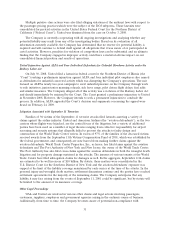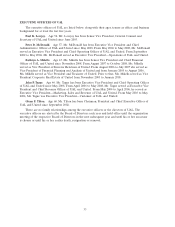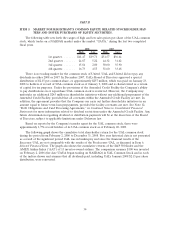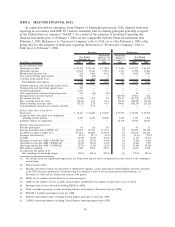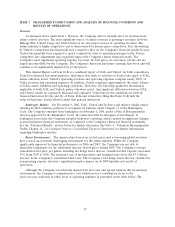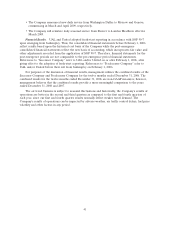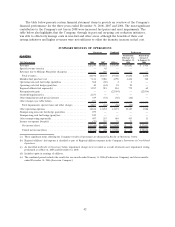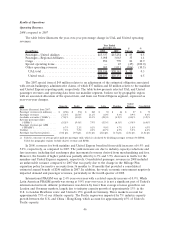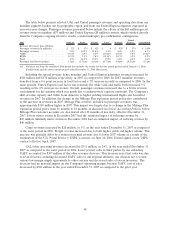United Airlines 2008 Annual Report Download - page 39
Download and view the complete annual report
Please find page 39 of the 2008 United Airlines annual report below. You can navigate through the pages in the report by either clicking on the pages listed below, or by using the keyword search tool below to find specific information within the annual report.• The Company continues to refit its wide body international aircraft with new first and business
class premium seats, entertainment systems and other product enhancements. As of December 31,
2008, the Company has completed upgrades on 25 international aircraft with new premium travel
equipment featuring , among other improvements, 180-degree, lie-flat beds in business class. The
Company expects its remaining 66 wide body international aircraft to be upgraded by 2011. The
upgrade of this equipment is expected to allow the Company to generate revenue premiums from
its first and business class international cabins. This new product will reduce premium seat counts
by more than 20%.
• In 2008, the Company ceased operations to Ft. Lauderdale and West Palm Beach, Florida, two
markets served by Ted, which uses an all-economy seating configuration to serve primarily leisure
markets. In addition, during 2008, as part of its operational plans the Company ceased operations
in certain non-Ted markets and also reduced frequencies in several Ted and non-Ted markets. In
light of these planned capacity reductions and other factors, the Company also determined that it
would eliminate its entire B737 fleet by the end of 2009. With the reduced need for Ted aircraft
in leisure markets and an increased need for narrow body aircraft in non-Ted markets due to the
elimination of the B737 fleet, the Company decided to reconfigure the entire Ted fleet of
all-economy Airbus aircraft to include first class, as well as Economy Plus and economy seats.
The reconfigured Airbus aircraft will provide United a consistent product offering for our
customers and employees, and increases our fleet flexibility to redeploy aircraft onto former Ted
and other narrow body routes as market conditions change. The reconfiguration of the Ted
aircraft will occur in stages with expected completion by the end of 2009.
• The Company was able to pass some of the higher fuel costs in 2008 to customers through
passenger and cargo fuel surcharges, among other means. The Company created new revenue
streams through unbundling products, offering new a la carte services and expanding choices for
customers. The Company’s existing Travel Options, such as Economy Plus and Premium Cabin
upsell have been extremely successful and the Company continues to implement new revenue
initiatives such as a $15 fee for the first checked bag, as well as a $25 fee to check a second bag
on domestic flights. Additional new Travel Options offered by United include Mileage Plus
Award Accelerator, which allows customers to multiply their earned miles for each trip by
purchasing accelerator miles upon ticket purchase, and Door-to-Door Baggage, which allows
customers to avoid the hassle of taking their luggage to the airport by arranging for the luggage
to be picked up from their home and shipped to their final destination. In addition, various ticket
change fees have increased, including Mileage Plus close-in fees.
• The Company reduced its capital expenditures in 2008 as compared to 2007 by more than
$200 million as discussed in Liquidity, below. In addition, the Company further plans to limit
capital spending to $450 million during 2009.
• The Company is streamlining its operations and corporate functions in order to match the size of
its workforce to the size of its reduced capacity. The Company expects a total workforce
reduction of approximately 9,000 positions by the end of 2009, of which approximately 6,000
positions were eliminated as of December 31, 2008. The total expected reduction will consist of
approximately 2,500 salaried and management positions and approximately 6,500 represented
positions. The Company has offered furlough-mitigation programs such as voluntary early-out
options, primarily to certain union groups, to reduce the required involuntary furloughs. Of the
total expected represented workforce reduction, approximately 40% have been through voluntary
furloughs through January 2009.
• A transatlantic aviation agreement to replace the existing bilateral arrangements between the
U.S. government and the 27 European Union (“EU”) member states became effective in 2008.
The future effects of this agreement on our financial position and results of operations cannot be
predicted with certainty due to the diverse nature of its potential impacts, including increased
competition at London’s Heathrow Airport as well as throughout the EU member states.
39




